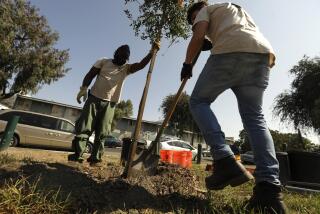Poverty Taking Heavy Toll, Panel Learns : Urban problems: Children especially suffer, witnesses tell county authorities. Poor health and overcrowding are termed common.
- Share via
POMONA — The picture of Pomona painted for the Los Angeles County Human Relations Commission last week was bleak: children in poor health, jobs hard to find, families doubling up in cramped apartments.
Academic researchers, social service workers and government leaders outlined the problems during a hearing convened Thursday by the commission to explore whether the changing racial and ethnic composition of Pomona has produced racial problems.
The city’s Latino population has more than doubled since 1980, putting Latinos in the majority. The 1990 census says Pomona’s population of 131,723 is 51% Latino, 28% white, 12% black, 6% Asian and the rest other groups.
While some speakers at the City Hall hearing said racism is a continuing problem in Pomona, the overriding concern Thursday turned out to be poverty.
“We have kids who are living in garages without water and electricity,” said Pomona schools Supt. Irv Moskowitz.
In some schools, 80% of the students come from families poor enough to qualify for free lunches and breakfasts, he said.
“If it weren’t for the schools, many kids would go hungry.”
Poverty and social problems have taken the schools far beyond their traditional educational role, Moskowitz said. The school district must employ an 18-man police force just to keep the campuses safe, he said. A school nurse is no longer adequate to deal with student health problems; the schools need full-blown health clinics, the superintendent said.
Stanley Bassin, adjunct professor of medicine at the University of California, Irvine, said a two-year study of Pomona schoolchildren indicates that their health is suffering because of poor diet and lack of exercise.
Bassin reported the interim findings of a study he is conducting with three other researchers involving 780 Pomona children in the fourth through sixth grades.
He said 14% of the children tested had high blood pressure, compared to 5% for that age group nationwide. Nearly half of the children failed to complete a mile run in 11 minutes and 45 seconds, a test that 85% of the children nationwide passed, he said.
Many youngsters could not run a mile at a pace that amounts to a “vigorous stroll” because they are “carrying the handicap of extra weight,” Bassin said.
The study found that 25% of the boys and 14% of the girls were high in body fat. In addition, he said, 16% of the children had high cholesterol counts and 42% were in the borderline-high category.
Bassin said the community should initiate after-school recreation programs to improve physical fitness. In addition, the professor said, families could improve their children’s diet by decreasing their consumption of high-fat items from fast-food restaurants.
The study indicates that children from families that have recently moved to the city are more physically fit than children born in Pomona, Bassin said, possibly because of a more active lifestyle.
The study also is focusing on tobacco and alcohol use.
Bassin said that 23% of the children reported that they had smoked cigarettes. Less than 5% said they had smoked a pack or more, but Bassin said this is a high number and reflects the fact that cigarette companies are targeting minority communities.
In addition, he said, nearly half the boys and 36% of the girls said they had taken at least one sip of alcohol.
Pat Irish, executive director of the Pomona Valley Council of Churches, said inadequate health care is just one of the problems facing families that seek food and other assistance from the council’s hunger program, which fed nearly 25,000 people last year.
Irish said poor families spend as much as 75% to 85% of their incomes on rent. Some are moving in with friends and relatives to save money.
“More and more families are doubling and tripling up--as many as 24 in one household,” she said. “They are one crisis away from being homeless.”
Irish said Pomona’s efforts to provide affordable housing are inadequate and the city also should be trying to attract employers who will provide well-paying jobs instead of “recruiting retail sales and other minimum-wage-type businesses.”
“The families we help with food want to work,” she said. “They want to contribute to the society and the community. Without child care, jobs, transportation and affordable housing, it becomes almost impossible.”
Minnie Lopez Baffo, president of the human relations commission, said the testimony will be considered by the commission in submitting a report to the board of supervisors recommending steps the county might take to help Pomona deal with its problems.
More to Read
Sign up for Essential California
The most important California stories and recommendations in your inbox every morning.
You may occasionally receive promotional content from the Los Angeles Times.













